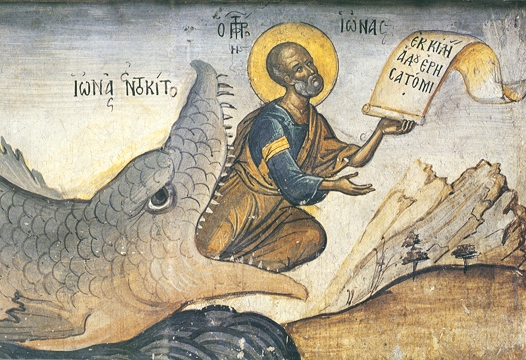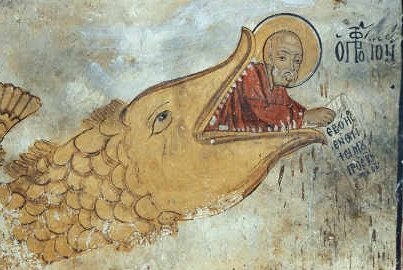Sermon at Baptistkirken Bornholm in Rønne, August 2018.

“An evil and adulterous generation craves a sign. Yet no sign will be given to it except the sign of the prophet Jonah, because just as Jonah was in the stomach of the sea creature for three days and three nights, so the Son of Man will be in the heart of the earth for three days and three nights.” (Matt. 12:39-40)
In today’s text we hear how Jesus once more has a fallout with the Jewish religious elite. The scribes knew their Bible through and through and ought to have had a sense of what was going on, when Jesus started healing people, driving out demons and proclaiming the presence of the Kingdom of God.
But the Pharisees want a sign. And we can’t blame them. Like them we don’t just accept everything without some kind of proof. But our relation to God is not a matter of proofs. We cannot with reason argue our way to faith. Faith is given by the Holy Spirit. Again and again we see in the New Testament, that it is not the scribes and the religious elite that come to faith, but the “poor in spirit” – those who have nothing but an acute need for God’s grace.
But, says Jesus, if you really want a sign, actually you have already got one, namely the sign of the prophet Jonah: Just as Jonah was in the belly of the sea creature for three days and three nights, so the Jesus will also be in the Realm of Death for three days and three nights.
Of course Jesus was only in his grave for two nights – which is something critics of Christianity like to point out. But the thing is with signs, that signs shouldn’t be taken to literally, as they are signs and not the matter itself. What’s important is what the sign signifies.
When Jesus reads the stories and prophecies from the Old Testament as being about himself, we can learn from this, that the Old Testament first of all has value as a witness about the Gospel. The texts – including the book of Jonah – must be read as a witness about Jesus.
From the earliest days of Christianity, critics have rejected the story of Jonah as way to implausible to be true. Today many biblical scholars have noticed, that the story probably comes from Pagan mythology. But for us, what matters is what Jesus makes of the story, not what is plausible or historical ‘facts’.
So what is the story about? The story of Jonah is first of all a story
about God’s grace and mercy. God has mercy on Nineveh – despite having said that he would destroy the entire city. The verdict had been pronounced, and it wasn’t conditional. Nevertheless, God shows mercy.
There’s a clear evangelic point, that on the other side of all the hard words about judgment and punishment there is a merciful ‘however’. The Gospel is that God is merciful in spite of everything. But Jonah becomes angry. He seems to have been looking forward to the destruction of Nineveh. Finally they would learn a lesson! In this way Jonah is a fitting picture of much religion – and perhaps also us as Christians. We too want order and justice, we want the guilty to be punished and so on. How annoying it is, when God turns out to be merciful!
From Jonah’s point of view, the story probably looks a bit different, though it’s also for him about God’s mercy. From Jonah’s point of view, the story is first of all about his conversion, when he had been swallowed by the sea creature and from its belly prayed for help. According to Jonah’s own word, he has ended up in the Realm of Death (or “the belly of sheol”, Jonah 2:2). Jonah has actually died, but exactly there, in the Realm of Death, Jonah learns that God is merciful. In hopelessness Jonah learns that there is hope. Jonah has faith without proofs or signs: “The earth with its bars closed upon me for ever”, says Jonah, but still he has a hope of God’s mercy. And eventually it did turn out, that Jonah was not to stay in the Realm of Death “for ever”, but only for three days.
The experience that Jonah had, has throughout Church history been seen as an expression of how we experience conversion and salvation: Human beings have to go through some kind of spiritual crisis, the experience of a deep spiritual darkness, leading to a final experience of being born again. From this perspective the book of Jonah shows us that God does not save people from death and hell, but through death and hell.
Following this line of thought, Jonah realizes that God is “present in his absence”. According to the medieval mystic Heinrich Seuse, this has to do with the nature of love as such: It is exactly when we experience the absence of love, that we realize how much love means to us. By experiencing God’s total absence in the Realm of Death, Jonah realizes how important God’s mercy really is.
This way of reading the book of Jonah can be quite edifying. In tough parts of our life it can be helpful to know, that it is not necessarily in life’s happiest moments, that we experience the presence of God, but rather the contrary, that God is closest when we are the most unhappy.
There are, however, also the risk that the idea of Jonah’s experience as an example of spiritual rebirth, can lead to new worries. If we think that salvation only follows after a radical spiritual crisis, we easily end up asking ourselves: “did I have this radical kind of experience, like Jonah?” or “am I really a born again Christian?”. And suddenly it’s all about our own self, our feelings and experiences.
But this is where we need to keep focus – and recall that it is Jesus’ use of the story about Jonah that we need to learn from. When Jesus talks about the sign of the prophet Jonah, it is not so much about us, but first of all about Jesus. The story of Jonah is a story about the cross and resurrection of Christ. It is Jesus who is to experience the uttermost darkness at the bottom of death, he who is about to go through a radical spiritual crisis in order to experience salvation.
This does not mean, of course, that the story is not about us at all. But only because it is a story about Jesus, his death and resurrection, is it also a story about us. We have all died with him – not because we have had some sort of radical spiritual experience, but because we died with him at the cross Christ (2 Cor. 5:14). And because he has risen we will rise again. Because of him we will be born again.
Now, of course Jonah knew nothing about all this. He probably thought about his experience as unique, and he might have seen himself as someone special, as being chosen by God. This at least explains why he couldn’t understand why God suddenly had mercy on Nineveh.
Something similar might have been the case with the Pharisees, the religious elites, whom Jesus debated. They too did not understand that the sign of the prophet Jonah was about something much greater, that it was about the all-embracing grace of God.
The challenge to us today is that we ask ourselves: Do I think that this story is about my own private spiritual rebirth or do I dare to believe, that it is first of all about the death and resurrection of Jesus and through him about all human beings?
